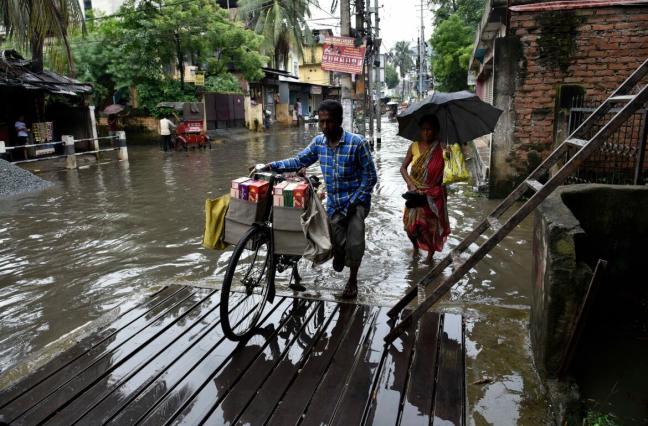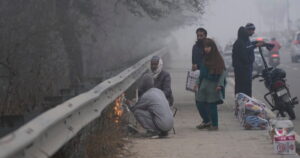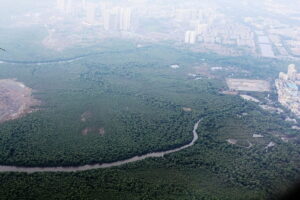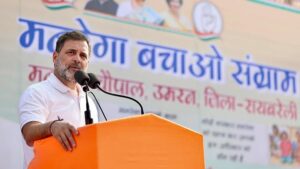Differential Vulnerability And Its Importance In Resilience Planning

Commuters wade through flooded streets after heavy rainfall in Guwahati, Assam (Photo by Shutterstock)
India is the seventh most climate-vulnerable country in the world, with nine of its states among the top 50 most vulnerable regions globally. The country’s cities are at the forefront of the climate crisis with more than 80% of the urban population living in hazard-prone districts.
Extreme heat, unpredictable flooding, and more frequent storms are increasingly straining urban communities. Underprivileged communities face the brunt of these impacts as they have fewer resources to cope with emerging climate hazards. Indian cities remain extremely unequal; with nearly half of urban residents living in informal settlements, slums or high-density and overcrowded resettlement colonies that lack accessible open spaces.
Such living environments foster conditions that lead to differential vulnerability to climate change. This means that often, even within the same ward or neighborhood, communities face uneven or differential levels of climate vulnerability due to unequal access to adequate living and working spaces, and limited access to the socioeconomic and political resources needed to cope with and adapt to climate hazards. As climatic threats increase and India’s urban population continues to grow, assessing differential vulnerability to climate change is crucial to developing robust and inclusive climate action and resilience plans that put the vulnerable first.
The new WRI India Report, Climate Resilient Cities Assessing Differential Vulnerability to Climate Hazards in Urban India outlines how cities can do this. Our research increasingly shows that failing to assess the social drivers of vulnerability results in ineffective resilience-focused interventions or worsens existing vulnerabilities.
Relevant actors, such as city officials, planners, consultants and community members need to understand what makes people vulnerable to climate hazards and effectively address the causes at the very onset of planning, designing and implementing interventions that promote resilience.
Historically, resilience interventions have been designed based on data on climate hazards – phenomena such as urban heat or flooding – without considering the social drivers of vulnerability. Climate vulnerability is greatly influenced by a variety of factors that determine a community’s ability to cope and adapt. In many ways, this is intuitive, wealthy communities have more resources to handle the effects of climate change than poor communities. Research also demonstrates that a range of factors, beyond just economic resources, matter (Thomas et al. 2019; IPCC 2022), such as social capital, secure housing, education and employment, political representation, good governance, reliable emergency services and transportation.
In ‘Climate Resilient Cities,’ we apply a people-centered, equity lens to assessing vulnerability, recognizing this as an integral step in planning for urban climate resilience. Incorporating robust analytical methods, data sources, and potential outputs, based on our work across three Indian states, we drive the case for integrating equity into climate action planning. The Climate Hazards and Vulnerability Assessment (CHVA) Framework presented in the report is meant to function at the city level, providing the basis by which planners, local leaders and community members deepen their understanding of which parts of their city are disproportionately vulnerable. This methodology not only creates a basis for broad resilience-focused planning, but also enables users of the CHVA Framework to zoom in on vulnerable hotspots for additional analysis and engagement. The Mumbai Climate Action Plan, for example, uses the CHVA approach to identify that 70% of all landslide-prone hotspots in the city are sited in informal settlements, making the poor more vulnerable to landslides than other Mumbaikars.
The CHVA approach helps to standardize and systematize work that has historically been piecemeal. Furthermore, it is designed to be iterative, and can be repeated over time to track progress on addressing vulnerability within a city, as well as to measure vulnerability levels between different cities. This can be supplemented with other tools, such as WRI’s Urban Community Resilience Assessment, to carry out more focused and granular assessments of vulnerability at the community level.
As the world’s most populous country, with the urban population expected to double by 2050, addressing climate vulnerability will be critical to furthering the Sustainable Development Goals (SDGs). Widening inequalities and the threatening impacts of climate change require a strong focus on people, nature and climate. Putting people firmly at the center of climate resilience is key to ensuring that climate action plans and strategies align with creating more equitable and livable cities.
(Published under Creative Commons from WRI-India. Read the original article here)





